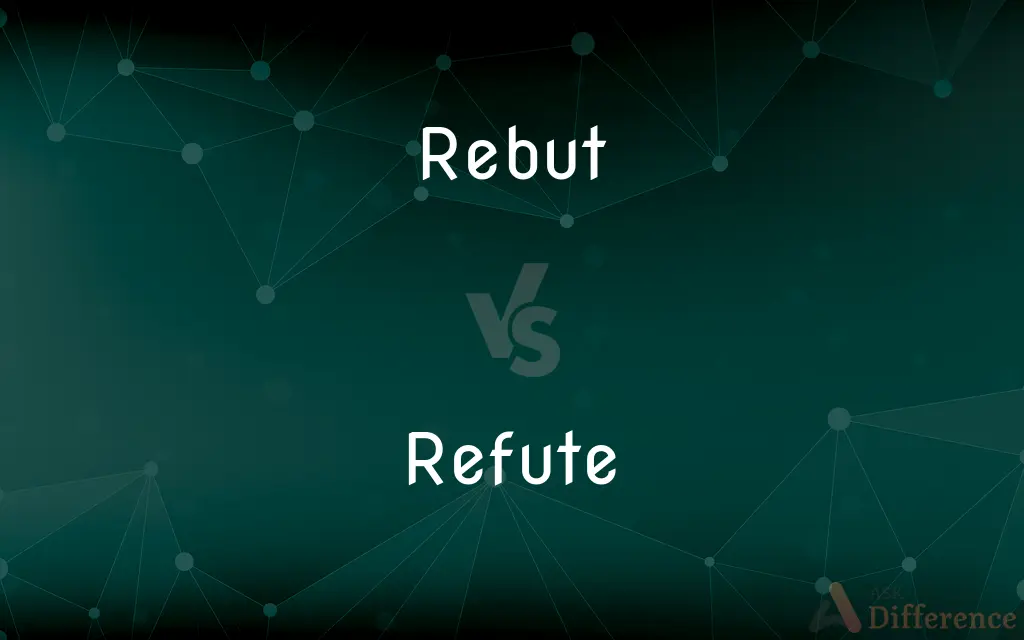Rebut vs. Refute — What's the Difference?
By Maham Liaqat & Fiza Rafique — Updated on March 26, 2024
Rebut involves arguing against a point; refute means disproving it with evidence.

Difference Between Rebut and Refute
Table of Contents
ADVERTISEMENT
Key Differences
Rebutting a claim means presenting counterarguments or evidence to challenge its validity or correctness. Whereas, refuting a claim goes a step further by providing evidence or arguments that clearly disprove or invalidate it.
Rebuttal is often the first step in a debate or argument, where one party responds to the claims of another by challenging the points made. On the other hand, refutation is seen as a more conclusive response, aiming to definitively prove that the opposing argument is wrong.
The intention behind a rebuttal can be to cast doubt on a claim or to introduce alternative viewpoints, without necessarily proving the original claim to be false. Conversely, the goal of refutation is to demonstrate conclusively that a claim is false or incorrect through logical reasoning and empirical evidence.
Rebuttals are common in legal and parliamentary debates, where participants respond to each other's points by presenting counterarguments. Refutations, however, are often found in academic and scientific contexts, where empirical evidence is used to disprove theories or hypotheses.
In essence, while both rebutting and refuting involve responding to arguments, rebutting aims to argue against or challenge, whereas refuting seeks to disprove or nullify an argument entirely.
ADVERTISEMENT
Comparison Chart
Definition
Argue against a point
Disprove a point with evidence
Intention
Challenge validity or correctness
Prove wrong definitively
Typical Context
Debates, discussions
Academic, scientific research
Outcome
Introduces doubt or alternative viewpoints
Demonstrates falseness or incorrectness
Evidence Requirement
Not necessarily conclusive
Requires conclusive proof
Compare with Definitions
Rebut
To oppose by evidence or argument.
Scientists often rebut outdated theories with new evidence.
Refute
Demonstrating the falsehood of a statement.
Witnesses refuted the allegations made against her.
Rebut
Engaging in debate to counter an argument.
She skillfully rebutted his arguments during the debate.
Refute
Disproving an argument with evidence.
He refuted the rumors with clear evidence to the contrary.
Rebut
Offering a counterargument to an assertion.
He rebutted the accusation with facts from his research.
Refute
To deny the accuracy or truth of a claim.
The data clearly refutes the hypothesis.
Rebut
To argue against or challenge a statement or theory.
The defense lawyer rebutted the prosecutor's charges.
Refute
Overturning a claim by logical argument or proof.
The mathematician refuted the longstanding conjecture.
Rebut
To respond to criticisms or objections.
The author rebutted the critical review in a follow-up article.
Refute
To prove a statement or theory to be wrong.
The study refuted the previously accepted theory.
Rebut
Claim or prove that (evidence or an accusation) is false
He had to rebut charges of acting for the convenience of his political friends
Refute
The defence called several respectable witnesses who were able to refute the false testimony.
Rebut
Drive back or repel (a person or attack)
But he … their sharp assault right boldly did rebut
Refute
Prove (a statement or theory) to be wrong or false; disprove
These claims have not been convincingly refuted
Rebut
To refute, especially by offering opposing evidence or arguments, as in a legal case
Rebut an allegation.
Refute
To prove to be false or erroneous; overthrow by argument or proof
Refute testimony.
Rebut
To repel or reject
She rebutted his advances.
Refute
To deny the accuracy or truth of
Refuted the results of the poll.
Rebut
To present opposing evidence or arguments.
Refute
Usage Problem To repudiate.
Rebut
To drive back or beat back; to repulse.
Refute
(transitive) To prove (something) to be false or incorrect.
Rebut
To deny the truth of something, especially by presenting arguments that disprove it.
Refute
To deny the truth or correctness of (something).
Rebut
To drive or beat back; to repulse.
Who him, rencount'ring fierce, as hawk in flight,Perforce rebutted back.
Refute
To disprove and overthrow by argument, evidence, or countervailing proof; to prove to be false or erroneous; to confute; as, to refute arguments; to refute testimony; to refute opinions or theories; to refute a disputant.
There were so many witnesses in these two miracles that it is impossible to refute such multitudes.
Rebut
To contradict, meet, or oppose by argument, plea, or countervailing proof.
Refute
Overthrow by argument, evidence, or proof;
The speaker refuted his opponent's arguments
Rebut
To retire; to recoil.
Refute
Prove to be false or incorrect
Rebut
To make, or put in, an answer, as to a plaintiff's surrejoinder.
The plaintiff may answer the rejoinder by a surrejoinder; on which the defendant may rebut.
Rebut
Overthrow by argument, evidence, or proof;
The speaker refuted his opponent's arguments
Rebut
Prove to be false or incorrect
Common Curiosities
What does it mean to refute a claim?
To refute a claim means to disprove it, providing evidence or logical arguments that demonstrate it is false.
Is refutation stronger than rebuttal?
Yes, refutation is considered stronger as it involves disproving a claim, while rebuttal involves challenging or arguing against it.
What is required for a refutation?
A refutation requires conclusive evidence or logical reasoning that clearly demonstrates a claim is false.
What does it mean to rebut a claim?
To rebut a claim means to argue against it, challenging its validity or correctness without necessarily proving it false.
Is a rebuttal a form of disagreement?
Yes, a rebuttal is a form of disagreement where one party presents counterarguments against another's claim.
Are rebuttals subjective?
Rebuttals can be subjective, as they often involve personal interpretations or alternative perspectives.
Can refutations be challenged?
While refutations are meant to be definitive, they can be challenged if new evidence or interpretations arise.
How do rebuttals and refutations contribute to debates?
They are essential for debates, as rebuttals introduce counterpoints and refutations can conclusively settle arguments.
Can a rebuttal also refute a claim?
A rebuttal can potentially refute a claim if it includes evidence or arguments sufficient to disprove the claim.
Do you need evidence to rebut?
While evidence strengthens a rebuttal, it can also consist of logical arguments or questioning the validity of the opposing claim.
Why is refutation important in scientific research?
Refutation is crucial in scientific research as it helps to correct inaccuracies and advance knowledge by disproving false theories.
Is it possible to refute a fact?
Facts are objective truths, so they cannot be refuted; however, what is considered a fact can be reevaluated with new evidence.
What makes a refutation effective?
An effective refutation provides clear, logical, and empirical evidence that irrefutably disproves a claim.
Can anyone rebut an argument?
Yes, anyone can rebut an argument, but effectiveness depends on the strength of their counterarguments.
How does one prepare to rebut or refute an argument?
Preparation involves gathering relevant information, evidence, and formulating logical arguments to effectively challenge or disprove a claim.
Share Your Discovery

Previous Comparison
Aquamarine vs. Aqua
Next Comparison
Spectra vs. SpectrumsAuthor Spotlight
Written by
Maham LiaqatCo-written by
Fiza RafiqueFiza Rafique is a skilled content writer at AskDifference.com, where she meticulously refines and enhances written pieces. Drawing from her vast editorial expertise, Fiza ensures clarity, accuracy, and precision in every article. Passionate about language, she continually seeks to elevate the quality of content for readers worldwide.















































